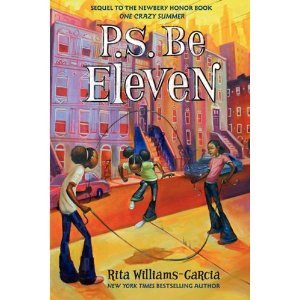In Portugal last fall I was struck by the lengths to which parents would go to shelter their children from the hardships of the economic crisis. When I visited the malls and department stores to practice my Portuguese vocabulary, I noticed that toys—especially those on markdown—sold out quickly during the holiday season while most other items languished. In desperation, one department store handed out gift cards with toy purchases, valid for any item in the store except toys.
 My recent experience in Portugal came to mind when I read Rita Williams-Garcia’s P.S. Be Eleven, the second volume in her three-part series featuring the unforgettable Gaither sisters. Readers met Delphine, Vonetta, and Fern in One Crazy Summer, when they journeyed from Brooklyn, New York to Oakland, California in the summer of 1968 to see the mother who had abandoned them when seven-year-old Fern was a baby. In the meantime, their mother, Cecile, had become the poet Nzila, and she sent the girls to a Black Panther summer camp so she could have time to write. In the sequel, the girls return to Brooklyn full of Black Pride and stories certain to outrage their conservative Southern-born grandmother, Big Ma, quite possibly the only person in their neighborhood to vote for Richard Nixon for President.
My recent experience in Portugal came to mind when I read Rita Williams-Garcia’s P.S. Be Eleven, the second volume in her three-part series featuring the unforgettable Gaither sisters. Readers met Delphine, Vonetta, and Fern in One Crazy Summer, when they journeyed from Brooklyn, New York to Oakland, California in the summer of 1968 to see the mother who had abandoned them when seven-year-old Fern was a baby. In the meantime, their mother, Cecile, had become the poet Nzila, and she sent the girls to a Black Panther summer camp so she could have time to write. In the sequel, the girls return to Brooklyn full of Black Pride and stories certain to outrage their conservative Southern-born grandmother, Big Ma, quite possibly the only person in their neighborhood to vote for Richard Nixon for President.
There are surprises in store for the girls as well. Their father has fallen in love with Mrs. Marva Hendrix and plans to get married. Their uncle, Darnell, has returned from Vietnam with some very big problems. Big Ma wants the girls’ father to cut Darnell a break, despite the fact that his problems are about to teach them a hard lesson. In her letters to Delphine, Cecile counsels this eldest sister to “be eleven,” but life is changing too fast, and Cecile isn’t there to help.
Williams-Garcia’s acclaimed first novel in the series explored the relationship between three girls and a mother whose hardship-filled childhood rendered her incapable of taking care of her own children. The author raises the stakes in the second novel, as a crisis in the girls’ stable Brooklyn family threatens their childhood innocence in a way that the Black Panther camp never did. However, the novel does not lose a bit of the humor and lyricism that distinguished One Crazy Summer. Readers old and young will delight in the cultural references from the period, including the girls’ infatuation with the Jackson 5, and the changing clothing and hair styles of the time that provide a flashpoint between Delphine and the girls at school who in typical fifth grade fashion are sometimes more rivals than friends.
1 comment for “Childhood Meets the Real World: A Review of P.S. Be Eleven”